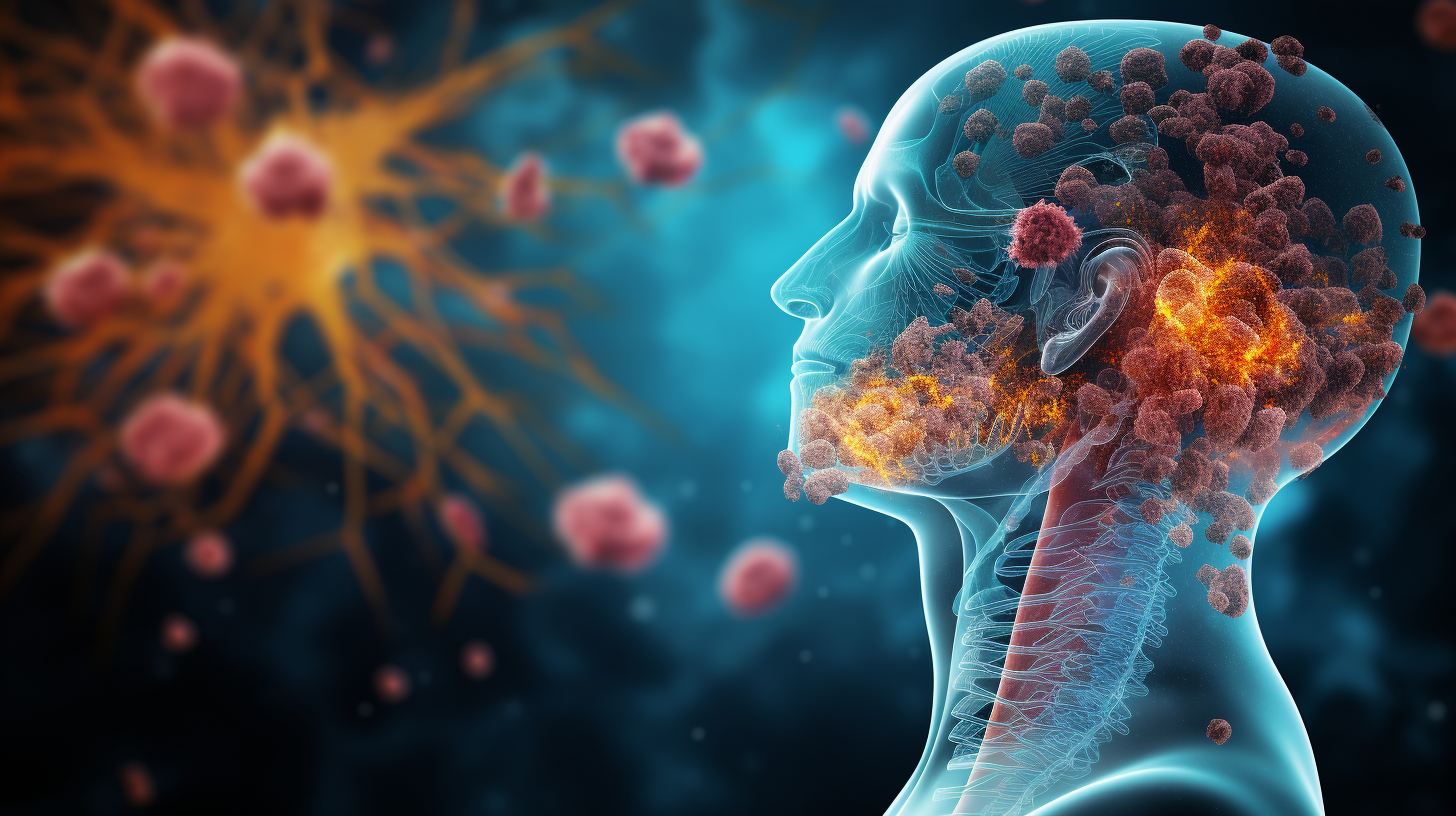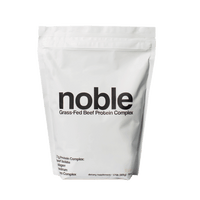
What is Hashimoto’s Disease? (Symptoms, Causes & Treatment)
Share
Feeling drained without any clear reason? Packing on a few extra pounds even though you're eating right and staying active?
It's not just the hustle and bustle of daily life; you might be facing a silent adversary: Hashimoto's Disease.
Did you know that Hashimoto's Disease silently impacts 1 in 20 people worldwide?
Its sneaky symptoms often fly under the radar, leaving many unaware of its presence.
Dive into our in-depth guide, and we'll shed light on the causes, tell-tale signs, and holistic treatments for Hashimoto's.
Ready to decode the secrets of your body?
Let's embark on this journey to better health together!
Key Takeaways
- Hashimoto's Disease is an autoimmune condition targeting your thyroid, leading to reduced thyroid hormone production.
- Common signs? Think fatigue, unexpected weight gain, constipation, and, for women, irregular cycles and a dip in libido. It might even play tricks on your memory and fertility.
- What triggers it? Watch out for certain meds, genes like HLA and CTLA-4, imbalanced iodine intake, and gender-specific factors.
- Diagnosis? It's a combo of a TSH test for hormone levels and antithyroid antibody tests for confirmation.
- The fix? Medications paired with lifestyle tweaks, especially in your diet.

What is Hashimoto's Disease?
Imagine your body's defense system turning on one of its vital members. That's Hashimoto's Disease for you. It's when your immune system, in a case of mistaken identity, targets your thyroid gland—a little butterfly-shaped powerhouse nestled at the base of your neck.
This gland, though small, is mighty. It's the maestro behind many of your body's metabolic symphonies.
But when Hashimoto's strikes, this maestro's performance falters, leading to hypothyroidism.
Ever heard of Dr. Hakaru Hashimoto? He's the pioneer who first painted a picture of this condition. And guess what?
It's more common than you might think, touching five in every 100 Americans, especially women and those in their prime years. (1)
The fallout?
A cascade of symptoms, from draining fatigue and sneaky weight gain to foggy memories and mood swings.
But here's the silver lining: You can dance to the rhythm of a healthy life with the proper treatment.
Who's at Risk for Hashimoto's Disease?
Hashimoto's Disease isn't picky. It can tap anyone on the shoulder, regardless of age or gender.
But, some folks find themselves in its crosshairs more often.
Let's talk numbers: Women and those assigned female at birth have a higher bullseye on their backs.
In fact, for every man or individual assigned male at birth with Hashimoto's, 10 females are grappling with it.
Most commonly, those in the 30-50 age range, primarily assigned females, find themselves facing this challenge.
In the US, that's about five in every 100 people.
But here's the kicker: Hashimoto's doesn't discriminate. It can throw anyone's body off balance, leaving a trail of fatigue, weight shifts, and more.
So, staying informed and vigilant is essential, no matter who you are.
What are the Symptoms of Hashimoto's Disease?
Symptoms of Hashimoto's Disease can vary, but common signs include fatigue, weight gain, and constipation.
Women may also experience heavy or irregular periods, decreased libido, and infertility.
Spotting the signs of hashimoto's disease
We must recognize Hashimoto's Disease's many faces to grasp it truly.
Are you feeling perpetually drained? Noticing the scale creeping up despite your best efforts? Or has that regular trip to the bathroom become a rarity? These are classic signs of Hashimoto's.
Hashimoto's might be the culprit if your skin's gone from dewy to desert-like or your once-vibrant hair seems lifeless and sheds more than usual.
Muscle stiffness or nagging joint pain isn't just wear and tear; it could be Hashimoto's alert.
And if your emotions are on a rollercoaster or a cloud of gloom seems to hover, it's likely due to the hormonal havoc Hashimoto's wreaks.
A swollen neck, or what we call a goiter, might make swallowing feel like a workout. And if your voice sounds raspier, Hashimoto's might be holding the mic.
Symptoms specific to women
Women with Hashimoto's Disease may experience a range of symptoms that are specific to their gender.
These symptoms can vary in severity and may include:
- Irregular periods: Women with Hashimoto's Disease may experience irregular menstrual cycles, with periods that are either longer or shorter than usual. They may also have heavier-than-normal bleeding during menstruation.
- Female infertility: Hashimoto's Disease can affect fertility in women, leading to difficulties in conceiving or maintaining a pregnancy. Women with this condition must work closely with their healthcare provider when starting a family.
- Decreased libido (sex drive): Some women with Hashimoto's Disease may experience a decrease in their sex drive, which can affect intimacy and relationships.
- Puffy eyes and face: Swelling or puffiness around the eyes and face is another symptom specific to women with Hashimoto's Disease.
- Memory problems: Women with Hashimoto's Disease may notice difficulties with memory and concentration. This can impact daily tasks and cognitive function.

What Causes Hashimoto's Disease?
Hashimoto's Disease can be caused by various factors, including medications that influence thyroid function, specific genes like HLA and CTLA-4, the role of iodine in the body, and sex-related factors.
How some meds might nudge you towards hashimoto's disease
While doing their primary job, certain meds might unintentionally meddle with your thyroid. And this interference could pave the way for Hashimoto's Disease.
Take lithium, for instance. It's a go-to for bipolar disorder but is also linked to a heightened risk of Hashimoto's.
Then there's interferon alpha, a treatment for hepatitis C and some cancers. It, too, can throw your thyroid off its game, nudging you closer to Hashimoto's.
Even some anti-seizure meds, like phenytoin and carbamazepine, can disrupt thyroid hormone production, leading to hypothyroidism.
If you're on any of these meds, stay informed. Chat with your healthcare provider about any thyroid-related concerns.
And remember, keeping a close eye on your thyroid function is critical. It ensures you're always a step ahead, ready with the right game plan. (2)
The genetic side of hashimoto's: Spotlight on HLA and CTLA-4
When it comes to Hashimoto's Disease, two genes often steal the limelight: HLA and CTLA-4.
Specific versions of these genes, like HLA-DR3, HLA-DR4, and HLA-DQ8, are more common in those with this autoimmune condition.
So, what's the big deal?
These genes are like the body's security system, deciding who's friend and foe. They're the gatekeepers of our immune response.
But here's the twist: when these genes go a bit off-script, it can blur the lines between self and non-self.
This mix-up can up the odds of autoimmune conditions like Hashimoto's knocking on your door.
And let's not forget CTLA-4. It's another key player in keeping our immune system in check.
But when there's a hiccup in the CTLA-4 gene, it can make one more prone to autoimmune challenges. (3)
Iodine & Hashimoto's: It's all about balance
Iodine is a double-edged sword regarding Hashimoto's Disease. On one hand, too little iodine can set the stage for this condition.
On the flip side, overdoing it can kickstart thyroid autoimmunity.
Here's the deal: Your thyroid craves iodine to whip up thyroid hormones. But like a gourmet recipe, the amount has to be just right.
Too much or too little, and things can go awry.
If Hashimoto's is on your radar, keep a keen eye on your iodine levels.
Chatting with a healthcare pro might be worth ensuring you're hitting that iodine sweet spot.
Navigating the iodine-Hashimoto's link can be tricky.
So, arm yourself with knowledge and make choices that are both informed and in tune with your body's needs.
Gender's role in Hashimoto's: Why women bear the brunt
Regarding Hashimoto's Disease, gender isn't just a footnote—it's a headline.
Women find themselves in the crosshairs of this condition far more often than men, facing a whopping ten times higher risk.
Most commonly, women in their 30s to 50s grapple with Hashimoto's.
And it doesn't stop at just causing fatigue, a bit of weight gain, or dry skin. This condition can also throw a wrench in fertility plans.
If Hashimoto's is part of your story, it's crucial to recognize the gender dynamics at play.
By understanding how your gender shapes your Hashimoto's journey, you're better equipped to steer your health in the right direction and tap into the care you deserve.
Diagnosing Hashimoto's Disease
To properly diagnose Hashimoto's Disease, healthcare providers typically use a combination of diagnostic tests, including the thyroid-stimulating hormone (TSH) test, free thyroxine (T4) test, and antithyroid antibody test.
These tests help determine the levels of thyroid hormones in your body and identify any autoimmune activity.
Common diagnostic tests
Diagnosing Hashimoto's Disease accurately is crucial to address the condition appropriately.
The following table summarizes the standard diagnostic tests for Hashimoto's Disease:
| Diagnostic | Description |
| Blood Tests |
These tests check for thyroid hormone levels, including thyroid-stimulating hormone (TSH), thyroxine (T4), and triiodothyronine (T3). |
| Antithyroid Antibody Tests |
Antithyroid antibody tests, such as thyroid peroxidase (TPOs and thyroglobulin antibodies, help confirm the diagnosis of Hashimoto's Disease. |
|
Ultrasound Imaging |
Ultrasound imaging of the thyroid gland evaluates the size and appearance of the gland. This test is essential, especially when an abnormality or nodule is suspected. |
|
Fine-Needle Aspiration Biopsy |
Physicians collect cells from the thyroid gland, specifically if a nodule or abnormality is detected, and examine them further. |
|
Thyroid Scintigraphy |
Also known as a radioactive iodine uptake test, it determines how well your thyroid gland is functioning. It's helpful to track the progression of the Disease. |
|
Genetic Testing |
These tests identify specific genetic markers associated with Hashimoto's disease. It's a thorough way to confirm the diagnosis. |
Correctly pinpointing Hashimoto's Disease is about more than just a single test.
It's a blend of detailed medical history, hands-on physical exams, and specific tests that give healthcare pros the whole picture.
But diagnosis is just the start.
Keeping a close watch on thyroid hormone levels and antibodies is crucial in staying ahead of the game with Hashimoto's.
And remember, it's a team sport.
The combined expertise of endocrinologists and primary care physicians ensures a sharper diagnosis and a tailored game plan for managing Hashimoto's.
Decoding Hashimoto's: What goes into the diagnosis
Diagnosing Hashimoto's isn't just about ticking boxes. It's about piecing together a puzzle.
Key clues are physical symptoms like constant fatigue, weight shifts, and bathroom troubles.
Blood tests that gauge thyroid hormone levels and spot antithyroid antibodies are vital.
A deep dive into one's medical history can spotlight potential triggers or risks.
But here's a curveball: Hashimoto's can masquerade as other conditions, making diagnosis tricky.
That's why teaming up with an endocrine specialist is essential.
They'll ensure you get a spot-on diagnosis and a treatment plan that fits just right.
Treatment Options for Hashimoto's Disease
At the heart of treating Hashimoto's Disease is balancing those hormone levels. But it doesn't stop there.
The journey is multifaceted, from tailoring your diet to navigating treatment during pregnancy and ensuring safe breastfeeding while on medication.
Dive into the array of treatment options for Hashimoto's and empower yourself to steer your health in the right direction!
Balancing Act: Hormones & Hashimoto's
Hashimoto's Disease throws a wrench in your thyroid's hormone production.
But there's a way to get things back on track: medication.
Enter levothyroxine, a synthetic thyroid hormone. It's the go-to prescription for Hashimoto's, helping regulate everything from metabolism to other vital body functions.
Stick to your doctor's game plan, and you'll tackle those pesky symptoms like fatigue and weight gain head-on.
And here's a golden rule: consistency is key.
Taking your meds as directed ensures a steady hormone balance, paving the way for better health and vitality.
Eating right with Hashimoto's: More than just a diet
When it comes to Hashimoto's Disease, what's on your plate matters. Tailoring your diet can be a game-changer in managing symptoms and boosting your well-being.
Let's break it down: Gluten can be a sneaky culprit, sometimes sparking autoimmune reactions in those with Hashimoto's.
Going gluten-free might be a smart move. Dairy, too, can fan the flames of inflammation, so you should think twice before reaching for that cheese.
Iodine is a balancing act. It's essential for your thyroid, but too much can backfire.
Before making any drastic changes, it's wise to chat with a healthcare pro about the proper iodine levels for you.
And remember the power players: anti-inflammatory foods.
Think vibrant fruits, leafy greens, and omega-3s.
They're your allies in dialing down the inflammation that comes with Hashimoto's.
Treatment during pregnancy
Pregnancy and Hashimoto's Disease? It's a journey that demands extra care for mom and the little one on the way.
Pregnancy brings hormonal shifts that can play tricks on thyroid function.
That's why having a healthcare pro by your side is non-negotiable.
Your hormonal dosage might need a tweak to keep things balanced.
And here's some peace of mind: taking thyroid meds during pregnancy?
It's typically safe and vital for a smooth-sailing pregnancy.
Breastfeeding with Hashimoto's medication
New mom with Hashimoto's? You might be pondering the safety of breastfeeding while on your meds.
Here's a sigh of relief: taking Hashimoto's medication, like levothyroxine, and breastfeeding?
They go hand in hand.
Your medication won't skip a beat just because you're breastfeeding.
Sticking to your prescribed dose is vital, ensuring you're at your best while you nurture your little one.
But, as with pregnancy, the postpartum phase might call for some dosage tweaks. That's where your healthcare pro comes in, guiding you every step of the way.
Breastfeeding is more than just nutrition: bonding, immunity, and love.
And while you're at it, remember to fuel yourself with wholesome meals and sprinkle in some exercise. After all, a healthy mom means a happy baby.
Navigating the Challenges of Hashimoto's Disease
Hashimoto's Disease, while manageable, can bring about certain complications.
Let's dive deep into understanding them and how they can impact your life:
1. The Hormone Hurdle
What Happens: Hashimoto's Disease often results in a dip in thyroid hormone production.
Why?
Your immune system gets overzealous, targeting your thyroid gland and causing inflammation.
The Fallout: This can lead to a cascade of symptoms like fatigue, weight gain, constipation, and even hair loss. Recognizing these signs is your first step to effective management.
2. Pregnancy and Hashimoto's: A Delicate Balance
The Risks: Expecting moms with Hashimoto's might face complications like preeclampsia and miscarriage.
The Strategy: It's all about balance. Ensuring stable thyroid hormone levels is paramount for both mom and baby.
Regular check-ins with healthcare pros and monitoring iodine intake are crucial.
Prevention & Management of Hashimoto's Disease
Due to genetic and environmental factors, Hashimoto's Disease can't be entirely prevented.
However, you can manage and reduce complications.
Regular medical check-ups and monitoring thyroid hormone levels are crucial.
Hormone replacement therapy, like levothyroxine, can restore hormone levels and improve life quality.
A balanced diet, regular exercise, stress management, and avoiding excessive iodine intake are also vital.
Living with Hashimoto's Disease
- Medication Matters: Regularly take levothyroxine as prescribed.
- Healthy Habits: Eat nutrient-rich foods and exercise to boost metabolism.
- Self-Care: Use relaxation techniques and ensure restful sleep.
- Stay Informed: Keep updated with the latest on Hashimoto's.
- Listen and Learn: Monitor your daily feelings and symptoms.
- Seek Support: Connect with friends, family, or support groups.
- Regular Check-ups: Monitor thyroid hormone levels with tests like TSH and T4.
- Patience is Key: It's a journey. Celebrate small victories.
When to Consult a Healthcare Provider
Chronic fatigue, unexplained weight gain, and persistent constipation could all be signs of this disease.
Early detection and treatment can enhance your life quality.
If you suspect Hashimoto's, don't delay seeing a healthcare provider.
The prognosis for Hashimoto's Disease
For those diagnosed with Hashimoto's Disease, the outcome largely depends on the condition's severity and its management.
Many can lead fulfilling lives with timely diagnosis, effective treatment, and lifestyle adjustments.
Regular consultations with a healthcare provider are essential to monitor thyroid hormone levels and consistently address emerging symptoms.
Outlook for individuals with Hashimoto's Disease
The general outlook for individuals with Hashimoto's Disease is optimistic, thanks to the benefits of hormone replacement therapy using synthetic thyroid hormones.
This treatment normalizes hormone levels, enhancing overall well-being.
Collaborating closely with your healthcare provider, especially for medication adjustments, is crucial.
Additionally, a balanced diet, regular exercise, stress-reduction techniques, and adequate sleep can further support the body in managing the effects of Hashimoto's Disease.
Conclusion
Hashimoto's Disease, a chronic autoimmune condition, can significantly impact the thyroid gland, leading to symptoms like fatigue, weight gain, and constipation.
While medication and regular monitoring are essential for managing this Disease, lifestyle choices are pivotal in overall well-being.
For those passionate about natural health, considering a holistic approach to nutrition can be beneficial.
Noble Origins offers a unique nose-to-tail nutrition, emphasizing the power of beef and nutrient-rich organs.
Their products, like the animal-based all-in-one protein, can be valuable to your wellness journey, providing essential nutrients that support overall health.
If you're experiencing symptoms of Hashimoto's or any thyroid-related issues, it's crucial to consult with a healthcare provider.
And as you navigate your health journey, consider exploring Noble Origins products to complement your wellness regimen.
Remember, with the right approach and resources, living with Hashimoto's Disease can be manageable, allowing you to lead a healthy and fulfilling life.
FAQs
What are the common symptoms of Hashimoto's Disease?
Common symptoms of Hashimoto's Disease include fatigue, weight gain, sensitivity to colds, muscle weakness, depression, and constipation.
What causes Hashimoto's Disease?
Hashimoto's Disease is an autoimmune disorder where the body's immune system mistakenly attacks the thyroid gland. The exact cause is unknown, but it is believed to be a combination of genetic and environmental factors.
How can Hashimoto's Disease be treated?
Treatment for Hashimoto's Disease typically involves taking synthetic thyroid hormone medication to replace the hormones your body can no longer produce effectively. Regular blood tests will help determine the correct dosage for each individual.
Can lifestyle changes help manage Hashimoto's Disease?
While there is no cure for Hashimoto's Disease, specific lifestyle changes can help manage its symptoms. These may include following a healthy diet rich in nutrient-dense foods, managing stress levels through relaxation techniques or therapy, regular exercise, and ensuring adequate sleep quality and duration. Consulting with a healthcare professional or nutritionist can provide personalized recommendations based on individual needs.
Related Studies
1. A study published by NIH conducted a systematic review and meta-analysis to evaluate the prevalence and trends of Hashimoto's thyroiditis in adults worldwide.
2. A study published by NIH discusses the effects of various medications on thyroid function. It notes that lithium ion is goitrogenic when used in the treatment of manic-depressive psychosis and can induce myxedema.
3. A study published by Nature analyzed the genetic interaction conditioning for HLA haplotype and provided evidence for a critical region that includes the CTLA4 gene.



